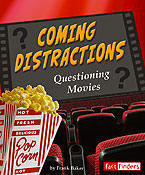|
|
Coming Distractions Questioning Movies Lexile Level: 700L |
Title Summary: Action flicks, romantic comedies, animated classics-there are all kinds of movies to choose from.
So how do filmmakers get you to watch their movie? Well, grab your popcorn. It’s time to ask questions about the messages in movies.
Description of series: Give young readers the tools they need to evaluate the barrage of media messages that reach them every day. Value assumptions, product placements, and cues to act are embedded in each media message. This fun series embraces media as entertaining and useful but also empowers readers as they learn a systematic way to question pop culture and to recognize how influential media messages are.
School Library Journal Review:Grade 4–7—These titles are designed to help children critique the media and understand the motives behind the production of popular entertainment. Each one makes it clear that producers create movies, magazines, TV programs, and online sites with particular audiences in mind, and that they target them by showing these specific population groups what they want to see. The authors also show how the media influences their audience and promotes particular values. All of the titles are organized around five basic questions: Who made the message and why? Who is the message for? How might others view the message differently? What is left out of the media? How does the message get and keep my attention? The books are written in a breezy style and have plenty of popping colors and photos. Sidebars labeled “Try it out!” suggest interesting activities that children can do to get firsthand experience with creating media and commercials. Each book has a spread indicating various jobs within each field. All of them show children how media is created and manipulated to attract attention and not necessarily to reflect reality. They also emphasize that what is left out of productions can be just as important as what is included. Overall, these are useful and attractive books that encourage children to begin thinking about media with necessary skepticism.
Share This Page:
